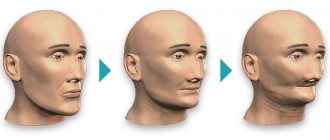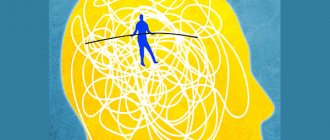German psychiatrist classification
Leonhard determined types of character in psychology by assessing a person’s communication style with the people around him. At the same time, he developed and presented independent types of characters.
- Hyperthymic type. Such people are distinguished by their talkativeness, extreme contact, expressiveness of facial expressions and gestures. A person may regularly deviate from the original topic of conversation in communication; he may constantly have occasional conflicts with people around him due to the fact that he is too frivolous about family and work responsibilities. As a rule, such people themselves become initiators of conflicts. At the same time, they have many positive features that attract partners for communication. This is a thirst for activity, energy, initiative, optimism. Repulsive traits include a tendency to immoral acts, frivolity, and increased irritability.
- Dysthymic type. The person is taciturn, uncommunicative, pessimistic about the surrounding reality, and leads the most secluded lifestyle. At the same time, he values his friends highly and is ready to obey them.
- Cycloid type. He is characterized by regular mood swings, which changes the way he communicates with people around him.
- Excitable type. Such a person is characterized by low contact in communication, slow nonverbal and verbal reactions. Such people are prone to abuse and rudeness, are gloomy and boring, and constantly provoke conflicts.
- Stuck type. These are moderately sociable people, prone to moralizing, and very taciturn. In any business they strive to achieve maximum performance and place increased demands on themselves. Vulnerable and touchy, sensitive to social justice.
- Pedantic type. They practically do not enter into conflicts and generally behave passively. At work they make many claims and demands on others, and behave like bureaucrats.
- Anxious type. People from this group are characterized by timidity and low communication skills. They are predominantly in a depressed mood and feel insecure. They rarely enter into conflicts with others and play an extremely passive role in them.
- Emotive type. Such people prefer to communicate exclusively among a select few. They carry grievances deep within themselves. People around them are attracted by compassion, kindness, and have a heightened sense of duty. At the same time, they are very tearful and sensitive.
- Demonstrative type. These people easily establish contacts with complete strangers, love to be praised, and strive for leadership and power. Demonstrating high adaptability, they are prone to intrigue. At the same time, they irritate those around them with their own self-confidence, boasting, and hypocrisy. They are attracted by their exceptional artistry, courtesy, extraordinary actions and thinking, and are able to captivate others with some idea.
- Exalted type. Amorous and talkative people. They argue constantly, but rarely lead to conflict. They are attentive to friends, altruistic, ready to sympathize and show sincerity. They are repelled by susceptibility to momentary moods and alarmism.
- Extroverted type. These are contact people with a lot of friends and acquaintances. They always have many acquaintances and close friends, they are open to communication and any information. They attract others with their diligence and willingness to listen to another person. Many do not like him because of their frivolity, passion for entertainment, rash actions, and regularly participate in the spread of rumors.
- Introverted type. These are closed people, divorced from reality. They love to be alone. They have strong beliefs about life around them and strict principles. At the same time, they are ready to persistently defend their ideals, even if they are fundamentally wrong and stubborn.
It is worth emphasizing that this classification applies mainly to adults.
Excitable type
They are characterized by increased impulsiveness, low control of their own desires and inclinations, which are often led. Uncontrollable during violent emotional reactions.
They often show irritability and intolerance towards their surroundings and cannot tolerate criticism.
To people with this accentuation, study and work seem neither fun nor attractive. They usually do not set long-term and difficult-to-achieve goals and live in the present.
It is difficult for them to get along in a team due to frequent conflicts. During them, they may show inappropriate emotional reactions, react violently and spend a long time sorting things out.
Types of accentuations
Types of temperament and character accentuation according to Leonard are divided into separate groups.
Temperament
The scientist attributed six types of accentuations to temperament, as a biologically determined formation. Let's talk briefly about each of them.
- Hyperthymic (hypomanic) temperament. Characterized by a predominance of an optimistic mood, a thirst for activity, a focus on success, and sociability. Negativity develops superficiality, an inability to complete a task. There is a violation of ethical standards, a waste of opportunities.
- Dysthymic type (subdepressive). The opposite of hyperthymic. Characterized by an orientation toward failure, pessimism, a serious ethical position, extreme passivity in action, and lethargy.
- Affectively labile type (cyclomic). It is characterized by frequent changes in hyperthymic and dysthymic states.
- Anxious. Characterized by the inability to defend one's point of view in a dispute, fearfulness, timidity, wariness, humility, and a humiliated position. Compensation in the form of feigned self-confidence or even impudent behavior is possible.
- The affectively-exalted type is distinguished by the intensity of experiences, violent emotional reactions, and a tendency to extreme manifestations of feelings (enthusiasm, despair). Easily charged by the mood of others.
- The emotive type is characterized by the ability to deeply feel and empathize. He is distinguished by his impressionability, kindness, and compassion.
Editor's Note: Ask an Expert
Character
Leonhard's character classification is represented by four types.
- Demonstrative (hysterical) type. The peculiarity of accentuation is the hypertrophied tendency to repression. This explains the ability of the hysteric to embellish reality. A person, as it were, enters into the desired image, beginning to believe his fantasies. Thanks to this trait, he easily adapts to his environment, instilling in himself a feeling of love and sympathy for others. The notorious “need for recognition,” as one of the motives of the demonstrative type, is exaggerated. Rather, the passion for self-praise is associated with the ability to repress objective information about oneself. For an ordinary person, if he wants to embellish the real state of things, the brakes are turned on. A hysteric person tends to forget himself, which often leads to rash actions.
- Pedantic character. In contrast to the demonstrative type, the repression mechanism is poorly developed. People with this type of personality are not able to repress doubts or discard unimportant details of the issue, so they can hardly make their choice on any decision. Hence indecision, scrupulousness in work, hypochondria.
- Stuck type. Characterized by the persistence of affective reactions. A penchant for ideas that completely take over a person’s thinking. Stuck affect is most clearly manifested in the case when a person’s personal interests are affected. Affect in these cases turns out to be a response to wounded pride, as well as to various forms of suppression, although objectively the moral damage may be negligible. As a result, the stuck type develops such traits as suspicion, hostility, jealousy, and morbid ambition.
- Excitable type (epileptoid). Characterized by following lower instinctive impulses and ignoring the voice of reason. As a result, impulsiveness, incontinence, demandingness, intolerance, hot temper, and conflict develop.
Extroversion/introversion
Character types according to Leonhard also include extroverted and introverted personality accentuations.
Due to the fact that most psychologists rely on the interpretation of terms according to Eysenck, and psychiatrists - according to Leonhard, such terminological discrepancy creates a problem in finding a common language between specialists.
According to Leonhard, the extroverted personality type is a conformist who does not subject to special analysis information coming from the outside, and therefore easily succumbs to the influence of others. An introvert, on the other hand, does not blindly succumb to the sensations of the present moment, focusing primarily on previous life experiences and his own conclusions. Here, Leonhard’s opinion coincides with the point of view of Carl Jung, who attributed to introverts the traits of thinking types, and to extroverts - ethical (experiencing) types.
Concept and types of accentuation
Accentuation of character in psychology is the individual characteristics of a person, characterized by a clear predominance of some character traits over others. This set of qualities is manifested in behavior, attitude towards other people and towards oneself, and is also the basis for the formation of certain life attitudes and worldview.
Some exaggerated character traits interfere with everyday life. For example, anxiety, as a common reaction to some kind of adversity and tense situations, is familiar to almost everyone. But if this feeling begins to haunt a person constantly, without any objective reasons, and turns into a constant background of prevailing anxiety, this problem must be dealt with. Otherwise, it can lead to nervousness and breakdowns in the future.
The following are some classifications proposed by famous psychologists. Although the typologies of different specialists studying this issue may differ slightly, there is general information.
Hyperthymic and cycloid
The hyperthymic type is characteristic of people who are poor strategists, but brilliant tacticians. They are enterprising, resourceful, active, and easily navigate changing circumstances. Due to this, they can significantly improve their social and professional position and move up the career ladder. But at a certain moment they tend to lose their position due to their inability to calculate certain actions in advance; they often make mistakes in people.
People with the hyperthymic type are sociable, active, enterprising, they are always in a good mood, at least in public. Children are restless, active, often play around and play pranks. Teenagers study unstably and have poor discipline. Because of this, conflicts arise with representatives of the older generation. They always have a lot of superficial hobbies, none of which really interests them. In life, they constantly overestimate their capabilities.
Cycloid accentuation is characteristic of apathetic and irritable people. As children, they constantly want to be left alone and do not like to play with their peers. They take any troubles very hard, and in response to any comments they become very irritated, even if they are the most harmless. Adolescents with cycloid accentuation experience dramatic mood changes.
In adulthood, the sharpest edges are smoothed out, but some can get stuck on their complexes, turning into melancholic and depressed individuals. Often their mood depends on the time of year.
Personal level
Additionally, the typology distinguishes 2 types of personality accentuation – extroverted and introverted. Their interpretation by Leonhard does not coincide with the interpretation by other scientists (Eysenck).
Extroverts easily fall under the influence of others and change their minds. They easily adapt to changed circumstances, successfully communicate with new acquaintances, and effectively master new information.
Introverts tend to draw on their own experiences. They are so immersed in their inner world that they are detached from reality and are not influenced by life circumstances. They tend to reason and philosophize more than to act. This type of personality does not allow interference in their life and defends their own views and principles. K. Leonhard considers introverts to be more strong-willed individuals.
Concept
The concept of “accented personality” was introduced by the German psychiatrist and psychopathologist Karl Leonhard. His classification of personalities had much in common with the concept of “latent psychopathy,” previously proposed by the Soviet scientist Pyotr Gannushkin. However, it was developed by Leonhard into an independent theory.
From the editor: Anatomical features of the brain stem
The scientist presented his thoughts on character typology in his work “Accented Personalities.” The first part of the monograph provides a classification and analysis of various accentuations; in the second, accentuated types are examined using the example of heroes from classical works of world literature.
At first glance, character accentuations according to Leonhard are similar to personality disorders, which leads to the assumption that there is a connection between them. However, the scientist only sought to identify those personality traits that bring difficulties to their owners in life. When describing accentuations, Leonhard turned to the negative manifestations of certain character traits in an extreme, most pronounced form. Therefore, his characterization of psychological types is perceived as an illustration of human shortcomings and painful patterns of behavior. However, accentuations according to Leonhard are still a manifestation of the clinical norm, albeit in a more acute form, and therefore cannot be used as a psychiatric diagnosis.
Psychologists and psychotherapists around the world are actively interested in issues of accentuation, since the disproportionate development of certain personality traits creates conditions for the formation of corresponding mental or psychosomatic disorders.
In Russian psychology, Leonhard’s typology was developed and supplemented by the scientist Andrei Lichko, who changed the original term “accentuated personality” to “accentuation of character.” After all, an accentuated personality, according to the Soviet psychiatrist, is too complex a concept, more consistent with the idea of psychopathy.
Correspondence table of accentuations according to Leonhard and Lichko.
| No. | K. Leongard (questionnaire by H. Smishek) | A.E.Lichko (PDO questionnaire) |
| 1. | – | Astheno-neurotic |
| 2. | Dysthymic | – |
| 3. | Demonstrative | Hysterical |
| 4. | – | Unstable |
| 5. | Stuck | – |
| 6. | Pedantic | Psychasthenic |
| 7. | – | Schizoid |
| 8. | Hyperthymic | Hyperthymic |
| 9. | – | – |
| 10. | Excitable | Epileptoid |
| 11. | Anxious-fearful | Sensitive |
| 12. | Cyclothymic | Cycloid |
| 13. | Affectively exalted | Labile hysteroid |
| 14. | Emotive | Labile |
| 15. | – | Conformal |
| Total | 10 | 12 |
Classification according to Leonard
The German psychiatrist Karl Leonhard thoroughly studied the problems and characteristics of the human psyche. He is one of the first authors to propose the concept of accentualization and personality typology.
Types of character accentuation according to Leonard:
- Emotive - distinguished by kindness, knows how to show compassion, appreciates family and friends. In business he is obligatory and executive. Among the shortcomings - he is prone to tearfulness and depression. Sometimes he is shy.
- Affectively exalted - has good aesthetic taste, sociable and open. But in stressful situations, he may succumb to panic.
- Affectively labile - characterized by a soft and vulnerable character. Cannot tolerate solitude and indifferent attitude of others. Prone to sudden mood swings.
- Anxious - friendly and kind. Can be overly self-critical and unsure of himself. Needs the support of others because he does not know how to defend his point of view.
- Hypothymic (disthymic) - serious, concentrated and taciturn. Values close people, but is often closed.
- The hyperthymic type of character accentuation is distinguished by activity, optimism and hard work. However, he does not always finish what he starts. Can't stand solitude.
- Excitable - prone to frequent mood swings. Usually behaves calmly and reservedly, knows how to take care of loved ones. However, during an emotional outburst, he has poor control over his behavior.
- Stuck - has responsibility, stress resistance, determination and perseverance. Demanding of himself. Disadvantages include vulnerability, suspicion, touchiness, and a tendency to jealousy. Sometimes it can get stuck on negative emotions.
- Pedantic - characterized by accuracy and scrupulousness. Strictly follows the rules, conscientious and calm. But if pedantry becomes hypertrophied, a person becomes boring and picky.
- Demonstrative - has charisma, good imagination and leadership qualities. Artistic and sociable. But at the same time he can be selfish and vain. It is painful if he is not given enough attention (in his opinion).
- Introverted. Closed and immersed in his inner world. Sociable only among close people. Has a good imagination.
- Extroverted. Sociable and friendly. Attentive at work. Can sometimes be frivolous and impulsive.
Typology according to Leonard
The scientist identified 10 accentuated types:
Demonstrative. This is a self-confident and vain individual, for whom his own personality is of greatest value. The people around you are not interested. In order to impress, he is ready to resort to flattery, lies and boasting.
Emotive. A weak personality, distinguished by kindness and compassion for others. Due to excessive fearfulness and sensitivity, an individual often does not risk taking responsibility, making decisions, or refusing someone’s request. Emotions and feelings come first for him. Hyperthymic. The hyperthymic type of accentuation is characteristic of success-oriented people. They strive to be active and achieve the desired results. They are distinguished by optimism, a positive outlook on life, and faith in luck. For such people, new emotions and experiences that bring pleasure are of great importance.
Dysthymic. This is the complete opposite of the previous character. The dysthymic type of accentuation is otherwise called hypothymic. Such people are always serious and initially focused on failure. They are often depressed. When starting a new business or finding yourself in unfamiliar circumstances, they experience anxiety and apprehension. Behavior is somewhat retarded.
Labile. Characterized by extreme mood swings. A person switches with lightning speed from one emotional experience to another. Labile psyche is characterized by increased sensitivity to signs of attention. The individual is oriented towards various standards, the loss of closeness with which becomes a real test.
Anxious. There is excessive suspiciousness and concern. A person is constantly afraid that something bad might happen. When communicating with others, he is timid and shy. Any failure is experienced very acutely. In the future, the fear of making a similar mistake again is formed.
Exalted. Emotions are elevated to a cult. Such individuals experience real jubilation from ordinary positive events or become depressed due to minor problems. Any emotion in this type is expressed much more clearly than in any other. An exalted (or affectively exalted) type of character is often characteristic of representatives of creative professions, who are distinguished by amorousness, sociability, and impressionability. All this is manifested in active gestures, rich facial expressions, rapid actions, etc.
Pedantic. Great importance is attached to preliminary consideration of actions and situations. Excessive indecisiveness leads to an overly responsible approach to any problems, both in personal and professional life. Any changes in usual circumstances are a source of stress due to increased rigidity of thinking.
Stuck. Individuals with a similar mental feature can be “stuck” in one negative emotional state for a long time. The impact is especially serious in situations where their personal feelings are hurt. Such people never forget the insults inflicted on them, so they often enter into conflicts.
Excitable. The main feature is hot temper. It is difficult for a person to control his own thoughts and behavior. If he is in a state of excitement, he is unable to control himself
In behavior, rationality gives way to instinctiveness: no rational arguments are taken into account due to the desire to release emotions or satisfy a momentary need.
Additional two types relate to the personal level: extroverted (focus on the surrounding reality, active interaction with it), introverted (the main attention is paid to one’s internal state, and the external environment is ignored as much as possible)
From the editor: Forms of schizophrenia and their symptoms
Psychasthenic type of character accentuation according to A.E. Lichko
This type, like the asthenoneurotic one, belongs to the types that lie at the point of contact between psychopathy and neurosis. A psychasthenic personality is prone to the development of neuroses, described in ICD-10 as anxiety-phobic disorders (F40), anxiety disorders (F41), obsessive-compulsive disorder (F42). Naturally, it is not always the case that a person with a psychasthenic type exhibits symptoms of psychiatric disorders, but since we are talking about accentuations in Lichko’s paradigm, i.e. as borderline states, it is necessary to mention this.
In childhood, manifestations of psychasthenia are practically invisible; they can be confused with shyness, indecisiveness, awkwardness, and a tendency to engage in intellectual activities. Some obsessions may be detected - fears (phobias) - fear of society, new surroundings, new situations, darkness, closed spaces. Much less often in children with psychasthenic accentuation one can notice obsessive actions or neurotic tics (winking, movements of arms or legs, head, wrinkling, sniffing, etc.).
Junior school age (7 years) is critical, because It is at this age that you can see all the manifestations of this type of accentuation. The child begins to be presented with demands, the fulfillment of which depends on his sense of responsibility, which is one of the most powerful blows for him as an individual.
If earlier the formation of psychasthenics was facilitated by difficult times, when upbringing took place in conditions of “increased responsibility” and children grew up early due to the need to become “parent substitutes” for younger brothers and sisters, and at least help their parents a little in financially supporting the family, now “increased responsibility”, pushing psychasthenics to quickly form a type, has a different nature. Nowadays, parents are trying to “saturate” their child’s life not only with all kinds of clubs, sections and activities, but at the same time they place very high demands on school performance. Naturally, in order to justify all the hopes placed on him, the child tries his best to meet the expectations of his parents so as not to lose their respect and love.
In adolescence, there are usually no sharp exacerbations, which distinguishes this type from others. A clear schedule for the child, the absence of the need (and then the opportunity, and, in the most extreme cases, the ability) to make independent decisions contribute to the child’s good adaptation even in the presence of pronounced accentuation features. The state of harmony can be disrupted by situations in which the demands on the child’s responsibility increase so much that the chance of not meeting expectations is higher than ever, for example, in situations of performing on stage or exams. Psychasthenic accentuation shows its greatest manifestations when a person reaches the age of 20-30 years.
The distinctive features of a psychasthenic in adolescence are indecision, some timidity, a tendency to reasoning and introspection, anxiety, suspiciousness, the easy occurrence of various kinds of obsessions (obsessions) - fears, actions, rituals, etc.
The fears, anxieties and suspiciousness of a psychasthenic relate primarily to the future. Often ideas about the future, although possible, are still unlikely. They themselves, as well as people close to them, to whom they may show pathological attachment, can become objects of anxiety.
Obsessive thoughts, rituals and actions become defense mechanisms against constant anxiety. Also, formalism and pedantry can be a defense. Consciously or not, a psychasthenic acts on the basis of a simple rule - “if everything is provided for, nothing bad will happen.” Unlike the epileptoid, the pedantry of the psychasthenic is far-fetched and formalistic, and does not promise him any benefits or benefits.
Shyness in actions and reasoning in a psychasthenic teenager go “hand in hand.” In words they can “move mountains,” but as soon as it comes to any significant choice in their life, they begin to suffer from indecision and an abundance of all kinds of options. Moreover, as soon as the choice is made, it must be immediately carried out.
Sometimes, trying to overcome themselves, teenagers with psychasthenic accentuation may seem overly self-confident, which is manifested in their judgments and intentions, decisive and react with lightning speed in those moments when it is necessary to show composure and stop and think. The failures that follow such actions further increase indecision and doubt about the future.
The physical development of psychasthenics differs from their peers. Manual skills and sports are not their forte. Often there is insufficient tone of the muscles of the arms and legs, awkwardness when making precise movements. At the same time, the legs are developed much better than the arms.
Behavioral reactions characteristic of all adolescents, psychasthenics, are weak and peculiar. If ordinary teenagers strive to separate from their parents and show their independence, then a psychasthenic demonstrates a pathological attachment to one of the parents, because the parent, in turn, acts as another means of psychological protection.
There is rarely a place for them in ordinary teenage groups, but they can get into the company of intellectuals and become a worthy member of the group.
Sexual development outpaces physical development, which often manifests itself in intense masturbation, which leads to remorse and the emergence of symbolic prohibitions.
Delinquency, alcoholism, drugs, suicidal behavior, etc. are unusual for psychasthenic teenagers. Their place is taken by obsessions, self-examination and reasoning.
Self-esteem, despite the tendency to introspection, is most often formed incorrectly. Often teenagers find that they have non-existent character traits, sometimes diametrically opposed to existing ones.
If we are talking about psychopathy, and not about accentuation, then it should be noted that psychopathy is distinguished by constant, albeit fluctuating in intensity, manifestations, obsessions and phobias that impair the ability to work and social adaptation.
In preparing this article, materials from Lichko A.E. were used. Psychopathy and character accentuations in adolescents. - St. Petersburg: Rech, 2010. - 256 p.
The line between normality and pathology
Trying to independently assess the degree of their own or someone else’s adequacy, people often wonder where the line between normal and pathological psyche and behavior lies. Various accentuations of character are defined as an extreme degree of clinical norm on the border with pathology. In the second half of the last century, namely in 1968, the German psychiatrist K. Leonhard introduced the concept of “accentuation”. He defined it as abnormal, overly enhanced individual personality traits.
Nine years later, in 1977, the Soviet scientist A.E. Lichko proposed using a more precise and narrow term “character accentuation.” It was these two scientists (K. Leongrad and A. E. Lichko) who made an invaluable contribution to the science of psychology, developing close, complementary concepts and classifications of accentuations.
Excessive emphasis and sharpness of certain character traits is perceived by a person and his environment as a kind of psychological problem that interferes with life, and therefore is mistakenly classified as a mental disorder.
- Influence on a certain area of life. Accentuation manifests itself in specific stressful and crisis situations affecting one area of life. Personality disorder affects all areas of a person's life.
- Temporality. Character accentuation most often manifests itself in adolescents and occasionally in adulthood. Serious mental disorders develop and tend to intensify later in an individual's life.
- Short duration of social maladaptation or its complete absence. Social maladjustment is a partial or complete loss by an individual of the ability to adapt to the conditions of the social environment. Accentuation, unlike a personality disorder, does not prevent a person from adapting to society and being a full member of it, or “unsettles” it for a short time.
- Accentuation of character can serve as an impetus for the formation of psychopathy only when the traumatic factors and impact are too strong and prolonged. Also, such a negative impact can provoke acute emotional reactions and nervousness.
Conformal, psychasthenic and paranoid types
Minors of the conformist type do not have their own opinions, they are not critical of themselves, and lack initiative. They are very easy to subordinate to some authority or group of people. The life attitude of most of them in any situation can be characterized by the words “be like everyone else.” At the same time, they are very conservative and prone to moralizing. To protect their interests, they are even ready to commit very unseemly acts, for which they find explanation and justification.
Adolescents of the psychasthenic type are prone to deep introspection, reflection, and assessment of the behavior of the people around them. In terms of their intellectual development, they are ahead of their peers; their indecision is combined with peremptory views and judgments, and self-confidence. When they need attentiveness and discretion, they are often prone to impulsive actions. With age, representatives of the psychasthenic type experience little change. This often ends in drug or alcohol use. In relationships, they are petty and despotic, this prevents them from normal communication with people around them.
It is interesting that the paranoid type is not always included in Lichko’s classification. The fact is that its main manifestations appear only after 30, or even 40 years. In adolescence and especially childhood, its representatives are usually classified as schizoid or epileptoid accentuation. In adulthood, inflated self-esteem and the idea of one’s own exclusivity begin to come to the fore. They differ from delusional ideas only in that others perceive them as quite real, albeit unreasonably exaggerated.
Typology according to Lichko
Soviet psychiatrist Andrei Lichko began studying this issue at the dawn of his activity. Lichko’s character accentuation table is in many ways similar to the typology presented by Leonhard. The author lists the following types.
Hysterical (demonstrative)
This type is most common among women, but it also occurs in men. It manifests itself most intensely in adolescence and young adulthood. With age, pronounced features of this type may decrease.
People with this character are characterized by increased emotionality. However, their sensitivity is not so pronounced. They easily endure insults and various adversities, but demonstrate strong emotions. In addition, they are characterized by sudden changes in mood and variability in behavior.
They try in every possible way to attract the attention of others. This desire is reflected in almost everything: actions, habits, clothing style and manner of communication. Such a person needs reverence, admiration, empathy, or, in extreme cases, openly expressed negative emotions. The main thing is that those around them do not ignore them or treat them indifferently.
They are very artistic by nature and are able to adapt to any situation. They almost always know how to look impressive, even in the absence of striking external features.
Epileptoid (excitable)
People of this type also have an increased need for the attention of others. However, they demonstrate this in slightly different ways - they complain, try to evoke sympathy and express dissatisfaction. As a rule, they focus more on the bad. They can harbor a grudge for a long time, and then throw out all the accumulated negative emotions.
Such a person does not tolerate change quite well. Most often, people of the epileptoid type adhere to an established and familiar order.
In everyday life, they are usually guided by their own opinions. Have difficulty accepting alternative views. They are often distrustful. Well developed critical thinking. However, if something doesn’t go according to plan, they can go into fits of rage.
This type of personality has many positive aspects: scrupulousness, a careful and attentive attitude to work, the ability to calculate the situation in advance and think rationally, energy, high efficiency, and determination.
Schizoid (closed)
Outwardly, such people may seem cold, distant and withdrawn. However, this is more likely due to an inability to communicate. For them it is a kind of defense mechanism . Withdrawal from the outside world, immersion in their own cozy world of fantasy and loneliness helps them remain protected.
They feel free only among a small circle of their closest people. They often scare off strangers with their strange behavior. But they are used to being perceived that way by those around them. In addition, they do not like to be the center of attention.
Among people of the schizoid type there are many creative individuals. A high degree of expression of imagination and desire for something new helps to find original ideas.
Cycloid (cyclothymic)
Their activities are characterized by ups and downs. The mood is quite changeable. Inspiration can suddenly give way to apathy or despondency. During periods of growth, these people are very sociable, show leadership qualities, embody creative ideas, achieve success and inspire others. But during periods of decline, they lose interest in everything that is happening, fall into procrastination and strive for solitude. In this state, their self-esteem is significantly reduced. They are extremely vulnerable to criticism and disapproval.
Under unfavorable circumstances and stress, the period of decline can be prolonged, and in rare cases even develop into a mental disorder.
Paranoid (suspicious and distrustful)
The main positive character traits are determination, perseverance and the desire to improve. But often the desire for success leads to a fear of being bad and excessive worry about the opinions of others. It’s as if there are two personalities living in such a person: one considers himself a complete insignificance, the second – perfection. Lack of internal harmony and constant confrontation leads to emotional fatigue.
Unstable and labile
These two manifestations are very similar. The difference is that people of the labile type are more likely to go to extremes. And any little thing can serve as a trigger for a change in mood.
Positive qualities of the unstable type include curiosity, a desire for innovation and an optimistic attitude. But it is difficult for him to achieve success due to laziness, weakness of will, constant search for bright impressions and a changeable emotional background. Sometimes these people find themselves in dangerous situations because they are looking for thrills. They lack the ability to think rationally and analyze what is happening. Often exposed to emotions.
The character of people with a labile character is characterized by frequent mood swings. Sometimes the trigger can be a minor reason, for example, the intonation or gaze of the interlocutor. They often go to extremes. Complete despair can suddenly give way to ecstatic joy. Their relationships with others and the quality of their work depend on their mood.
People with this type of accentuation are sociable, but dependent on praise or criticism. Their stress resistance is extremely low. They cannot always find the strength to cope with difficulties and need the support of loved ones. However, they are distinguished by openness, sincerity and loyalty.
Conformal (dependent)
Such people are very susceptible to external influence. They follow the crowd and do not trust their own judgment if the majority has a different opinion. Poorly developed critical thinking and ability to analyze. They are afraid to stand out and try to follow fashion. They are quite conservative. They lack independence, originality and activity. However, this type of personality does not threaten to transform into pathology.
Astheno-neurotic and psychasthenic
Both types have many common characteristics, with the only difference being that people of the psychasthenic type are more indecisive and prone to neuroses. Otherwise they are very similar. Representatives of both types get tired quickly, often experience irritation and do not tolerate stress well. They are intellectually developed, strive for self-improvement, but do not always cope with difficulties due to increased anxiety. The cause of anxiety may be situations such as an upcoming exam or interview, competition, or competition. However, they highly value good relationships with people and are always ready to help and show sympathy.
Parting is hard to bear. This is due to the fact that they rarely let anyone get close and the departure of one of these people will be perceived as the loss of a significant part of their life. Such people often exhibit dysthymia (depressed mood).
They are prone to deep thinking and are able to capture what remains invisible to other people. It may seem to others that people with the schizoid type are unemotional, but in reality they are seething with vivid emotions inside. It is difficult for them to talk about feelings, even if the desire arises. In order to find out their inner experiences, it is best to use indirect methods: discussing films, books or music.
Hyperthymic (overly active)
These are the people who most often become the “life of the party.” They are optimistic, very sociable, energetic and friendly. They know how to find the positive sides in everything. Among the disadvantages: they do not cope well with work that requires careful execution and attentiveness, and are prone to wastefulness. Overreacting sometimes gets in the way in everyday situations. Most often, hyperthymia manifests itself in adolescence.
Sensitive (sensitive)
Such a person has high sensitivity and the ability to empathize. Sometimes he is overly impressionable and unsure of himself. He finds it difficult to cope with stressful situations and make rational decisions. Sometimes he is pessimistic. He is always conscientious, diligent and committed in his work. But under stress, he can be overly emotional and unpredictable.
Unstable, emotionally labile and epileptoid types
Teenagers with unstable personality types constantly gravitate towards idleness and entertainment. They have no life goals and interests in life; they care little about the future. In most cases, those around them characterize them as people going with the flow.
Children with an emotionally labile personality type are characterized by strong and regular mood swings, and their behavior is unpredictable for others. It is noteworthy that any little things can become the reason for such mood changes. For example, an unfriendly phrase or a sidelong glance. When they are in a bad mood, adolescents with an emotionally labile personality type feel the need for support from loved ones. They feel well how others treat them.
At an early age, representatives of the epileptoid type are very tearful. But when they grow up, they themselves begin to offend the little ones, preferring to mock those who are not able to fight back. They are characterized by cruelty, power and pride. In the society of other children, they strive not just to become leaders, but real rulers. In groups that take control, they establish the most rigid, sometimes even autocratic, orders. They are able to please management and often occupy influential positions due to this.
Sensitive type
It is highly sensitive to both joyful and frightening or sad events. Teenagers do not like active, active games, do not play pranks, and avoid large companies. They are timid and bashful with strangers and give the impression of being withdrawn. They can be good friends with close friends. They prefer to communicate with people younger or older than them. Obedient, love their parents.
It is possible to develop an inferiority complex or difficulty adapting to a team. They place high moral demands on themselves and the team. They have a developed sense of responsibility. They are assiduous and prefer complex activities. They are very careful in choosing friends, preferring older ones.








